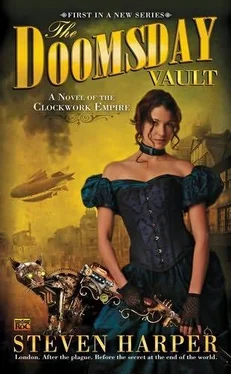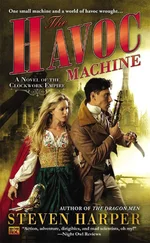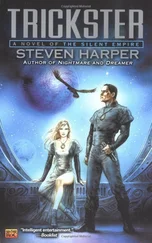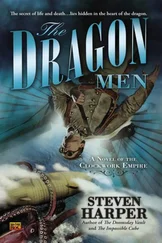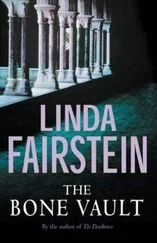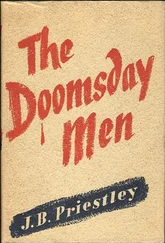Steven Harper - The Doomsday Vault
Здесь есть возможность читать онлайн «Steven Harper - The Doomsday Vault» весь текст электронной книги совершенно бесплатно (целиком полную версию без сокращений). В некоторых случаях можно слушать аудио, скачать через торрент в формате fb2 и присутствует краткое содержание. Жанр: sf_fantasy_city, на английском языке. Описание произведения, (предисловие) а так же отзывы посетителей доступны на портале библиотеки ЛибКат.
- Название:The Doomsday Vault
- Автор:
- Жанр:
- Год:неизвестен
- ISBN:нет данных
- Рейтинг книги:5 / 5. Голосов: 1
-
Избранное:Добавить в избранное
- Отзывы:
-
Ваша оценка:
- 100
- 1
- 2
- 3
- 4
- 5
The Doomsday Vault: краткое содержание, описание и аннотация
Предлагаем к чтению аннотацию, описание, краткое содержание или предисловие (зависит от того, что написал сам автор книги «The Doomsday Vault»). Если вы не нашли необходимую информацию о книге — напишите в комментариях, мы постараемся отыскать её.
The Doomsday Vault — читать онлайн бесплатно полную книгу (весь текст) целиком
Ниже представлен текст книги, разбитый по страницам. Система сохранения места последней прочитанной страницы, позволяет с удобством читать онлайн бесплатно книгу «The Doomsday Vault», без необходимости каждый раз заново искать на чём Вы остановились. Поставьте закладку, и сможете в любой момент перейти на страницу, на которой закончили чтение.
Интервал:
Закладка:
“But what did the clockworker want ?” Alice demanded. “What was all that for ?”
The woman shrugged. “Clockworkers live in a world of their own. No doubt gathering an army of zombies to tip over beer vans made perfect sense to him. Did they touch you?”
“No.” Alice glanced down at her ruined gown. “But I don’t think I’ll be wearing this again. And it was my only one.”
The woman clucked her tongue. “I’m sorry about that.”
“How does that machine work?” Alice asked, suddenly eager to change the subject. “And why did Mr. d’Arco need me to play a tritone?”
“Ah. I’m afraid I can’t go into that here,” the woman said. “But listen, love, there’s clearly quite a lot to you, far more than that dress can contain. If you ever need help, or if you find you need a change in your life, write to me, all right?”
She handed Alice a card. On it was written:
Miss Glenda Teasdale
Third Ward
v2
“Are you an Ad Hoc woman?” Alice blurted.
Glenda smiled. “Of course. There should be no other kind, if you ask me.”
At that moment, d’Arco rode up on Glenda’s horse, his dark eyes inquisitive beneath mussed black curls. Alice noted for the first time how handsome d’Arco was. His features were even, his jaw long, his smile wide. His body was long and lean beneath his topcoat.
“Did you thank her?” he asked. “Did you tell her she was wonderful?”
“I did, Simon,” Glenda said. “And I’ll thank you to give me Roulette back. You can drive the cart back to headquarters.”
“Your cab is still sitting over there,” d’Arco told Alice as he dismounted. “I’d offer to see you home, but we simply can’t leave the machinery. Can you drive it? What am I saying-a woman of your talents could probably shoe the horse.” And Alice had to laugh.
The drive home was uneventful, and Alice was surprised at how little fear she felt. She should have been jumping at every shadow, but she felt perfectly calm, even a bit thrilled, as she guided the horse through damp streets. The Dress was in violet tatters, her hair was coming down, and anyone might see her in the driver’s seat of the shabby hansom, but she didn’t care in the slightest. She allowed herself a little whoop of glee.
This, she decided, must be how Louisa felt all the time.
When she arrived home, she climbed down from the hansom cab and, not knowing what else to do, left it in the street. The horse would no doubt eventually return to its stable on its own, or its owner would remember Alice’s address and come looking for it, or someone would steal the beast. Alice had to admit she didn’t much care at this point. She retrieved her pocketbook from the cab floor and wearily climbed the short steps to the run-down row house she shared with her father, Arthur, Baron Michaels. When she entered, a clockwork cat leapt down from the windowsill with a light clicking of iron claws. It peered up at her, segmented tail switching back and forth, lamplit eyes glowing with unearthly green phosphor.
Alice reached down to pat the cat’s head. “Hello, Click. I’m glad you waited up for me.”
The cat made a rumbling noise that sounded nearly like a purr, batted at her tattered sleeves, then abruptly scrambled to his feet and rushed out of the room. Alice shook her head and suddenly realized she was starving. She tiptoed past her father’s study-cum-bedroom and slipped into the tiny kitchen, where she threw together a sandwich, her dress bulging inconveniently about her. Click jumped up on the counter to watch, his phosphorous eyes casting small circles of light over the bread and ham. He swatted at her hand, and she tapped his nose with the knife handle with a thin clank in admonishment.
“You don’t even eat,” she said.
Click meowed at her, somehow managing to sound a little huffy. He looked as if he wanted to say something, but actual speech wasn’t part of the codex that ran the tiny analytical engine in his head, and for this Alice was wryly grateful-a talking clockwork cat would be dreadfully obnoxious.
She put sandwich and tea on a tray with a candle and bustled upstairs, not wanting to awaken Father. The thought of having to explain the condition of The Dress to him filled her with dread.
The yellow fog continued to shoulder itself against the windows as Alice entered her room. Her candle provided only a little light, but putting on a gas jet would cost too much. Like Father’s study, Alice’s room lacked much furniture, but Alice had learned to weave rag rugs, and they added warmth to the floor. Under the window stood her workbench-a tall table with several drawers under it and a stool to sit on. Several wooden shipping boxes were stacked on the floor, all of them with Alice’s address on them. Cogs, flywheels, and tiny barrels for analytical engines littered the tabletop, and an array of tools hung neatly on hooks from the wall above. Standing incongruously nearby was a dressmaker’s stand for The Dress.
Alice flung open the wardrobe. “Out, please,” she said. “I need help.”
From the wardrobe flittered, crawled, and scampered a dozen small machines, automatons of brass and copper. Some skittered on half a dozen legs; others buzzed about beneath whirling blades. All of them possessed tiny, intelligent eyes and long-fingered hands.
“I need to get ready for bed,” Alice told them.
The automatons instantly set to work. They zipped about the room, their tiny hands tugging Alice out of The Dress, or what remained of it, clicking and squeaking to themselves all the while. Petticoats and lacings and corset all fell away, layer by layer. The automatons unfastened dozens and dozens of buttons. One of the automatons, a flier, seemed to be having trouble staying aloft. It labored, then dropped toward the floor. Alice caught it, halted the others in their work, and took the little machine to her workbench. Standing in her petticoats, she popped the key from the windup mechanism, deactivating the automaton, and swiftly disassembled it.
Alice hadn’t built her automatons, of course. They had arrived in pieces at Christmas, her birthday, Easter, even Guy Fawkes Night, along with complicated instructions for assembly and activation. And always at the bottom of every box of parts lay hidden a small pasteboard card with a handwritten scrawl: Love, Aunt Edwina.
The little automatons had started off fairly simple and had become more and more complicated over the years. Assembling them had given Alice quite an education in mechanics, engineering, and basic physics, and sometimes she wondered if that was the purpose Aunt Edwina had in mind.
Alice barely remembered her aunt Edwina. According to her father, the last time he had spoken to her was after Alice’s ninth birthday, just before the clockwork plague struck the Michaels family. It had killed Alice’s mother and older brother, forced her father into a wheelchair, and marked the Michaelses as socially undesirable. Aunt Edwina had withdrawn to her small estate outside London, snubbing the society that was trying to snub her and living her life as she liked. She wore trousers instead of skirts, talked to strange men without a proper introduction, and supported suffrage years before the Hats-Off Committee appeared in Parliament. In order to wheedle his way back into the social graces of the traditional folk, Arthur Michaels publicly repudiated his sister’s behavior and declared her a bad influence, though he didn’t refuse the little automatons she sent to Alice.
Click jumped up on the workbench, and Alice briefly touched the cat’s smooth head before going to back to work, her stiff petticoats hitched unbecomingly around her knees. Click had arrived fully assembled as an engagement present from Aunt Edwina three years ago, when Alice was eighteen. Father had arranged a marriage to Frederick Trent, a business associate. Knowing she had few other prospects, Alice hadn’t protested. In a stunningly unfortunate series of events, however, Frederick Trent himself contracted the clockwork plague from an errant beggar and died a week before the wedding.
Читать дальшеИнтервал:
Закладка:
Похожие книги на «The Doomsday Vault»
Представляем Вашему вниманию похожие книги на «The Doomsday Vault» списком для выбора. Мы отобрали схожую по названию и смыслу литературу в надежде предоставить читателям больше вариантов отыскать новые, интересные, ещё непрочитанные произведения.
Обсуждение, отзывы о книге «The Doomsday Vault» и просто собственные мнения читателей. Оставьте ваши комментарии, напишите, что Вы думаете о произведении, его смысле или главных героях. Укажите что конкретно понравилось, а что нет, и почему Вы так считаете.
